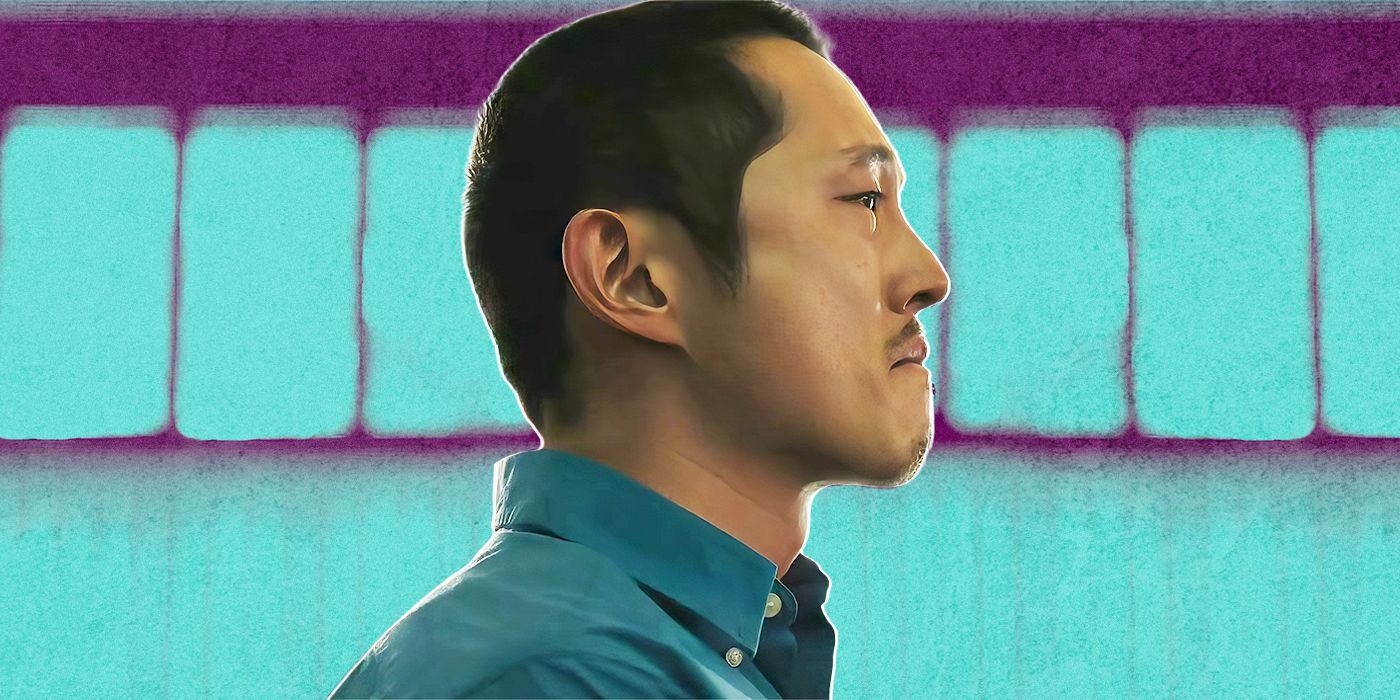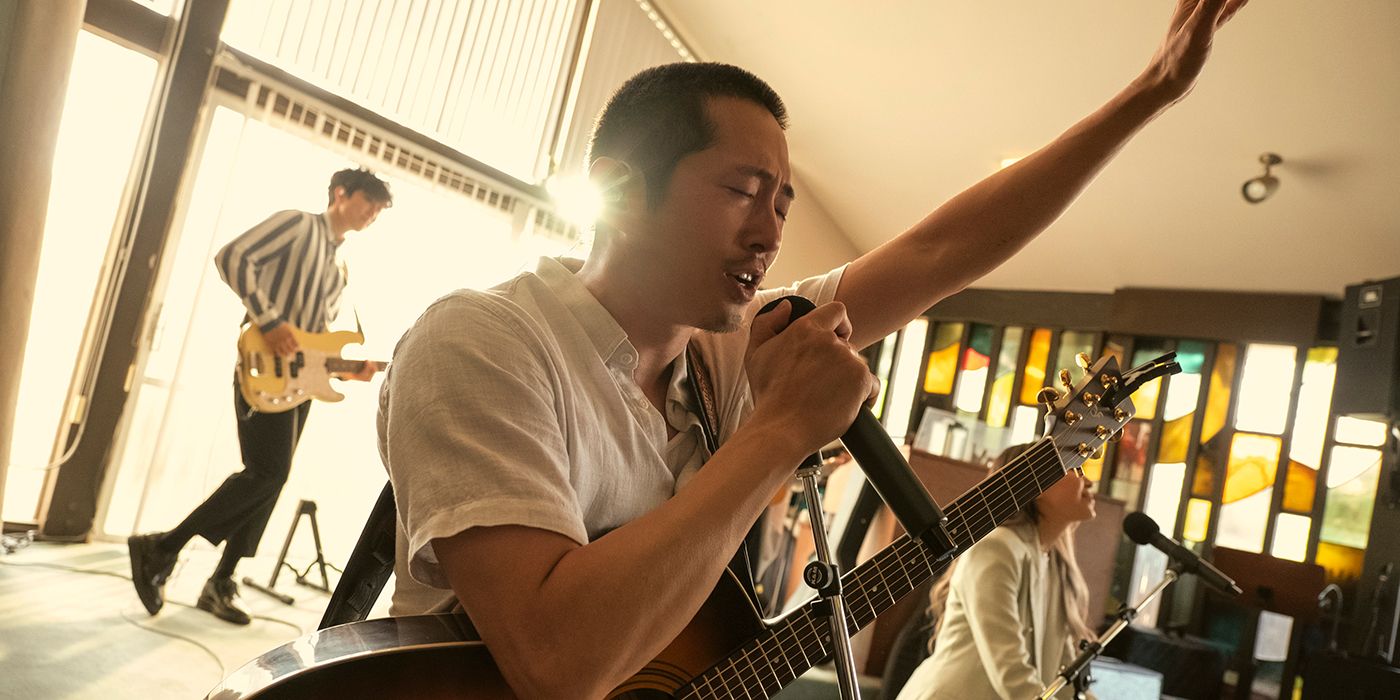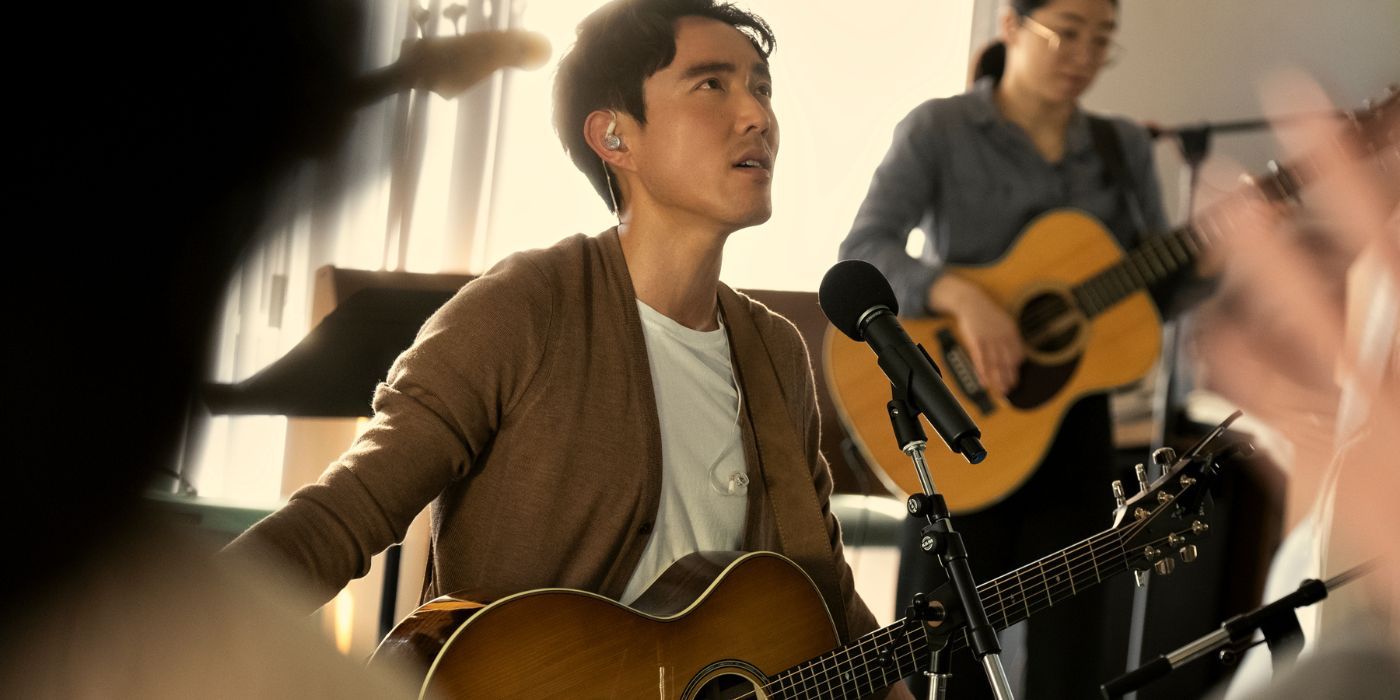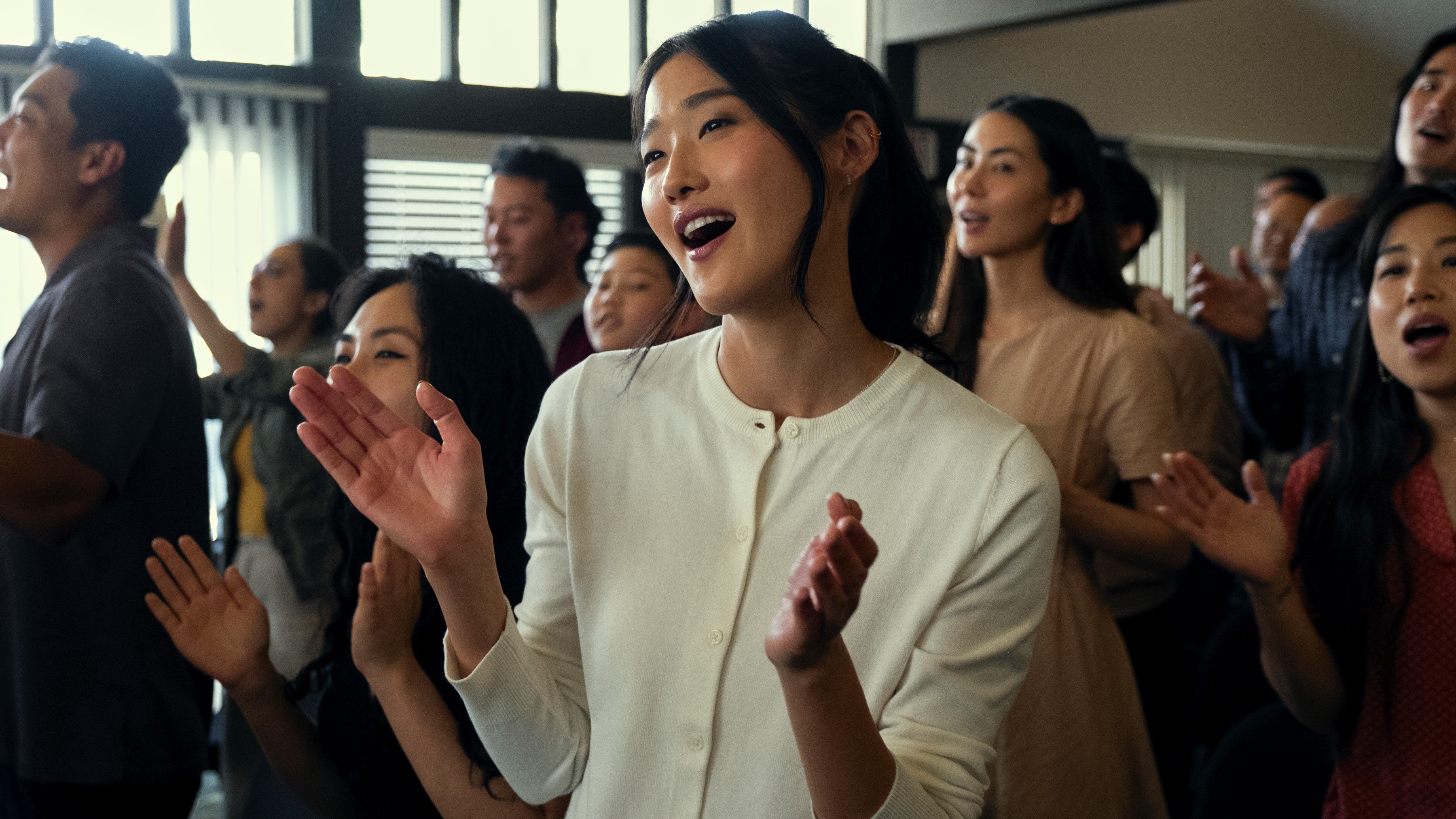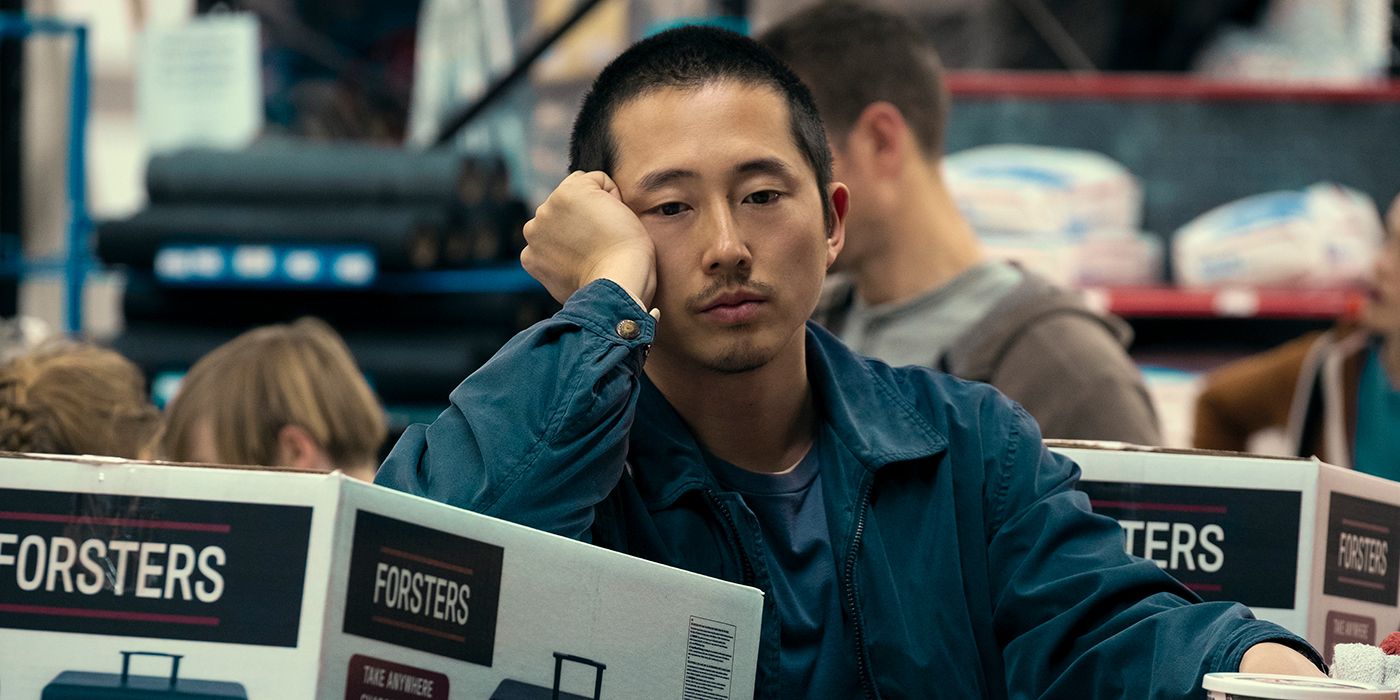Editor's Note: The following contains spoilers for Beef.
In what has been hailed as Netflix's best series of the year, we see seething anger manifest itself in road rage, a hostage situation, running from security guards in a Las Vegas casino, and urinating across someone’s bougie bathroom, so it might be surprising that one of the most intense scenes in a series of emotional fervor takes place in a church. In the third episode of Beef, Steven Yeun’s Danny Cho breaks down while singing with a Korean church’s congregation during a worship service. The moment captures the complexity of the Evangelical experience. Unlike more docile branches of Christianity, Evangelism can evoke overwhelming feelings during a service. It’d be uncommon to see tears shed during an Orthodox Matins or a Catholic mass, but heavy displays of emotions, hands lifted, knees bowed are ubiquitous with Evangelism. In a show focusing on release in various forms, Beef shows an understanding that release can also be a part of churchgoing.
Understanding the Korean Church
To understand the scene in its cultural context, one must understand how the church became so relevant to Korea and its diaspora. Christianity was first introduced to Korea in the 18th century in the form of Catholicism. The spread of Christianity in Korea was unique in that it gained traction from Koreans themselves instead of missionaries who mostly focused their proselytizing on neighboring China and Japan. Protestantism became popular in the 20th century. Christianity’s spread became momentous for nationalism. There was a belief shared among Christian leaders in Korea that Christianity could ward off foreign invasion and social instability by creating civic morality.
The Pyongyang Revival in 1907 was the fundamental movement for Korean Protestantism. The revival came at a politically deleterious time for Korea when it was annexed by Japan in 1910 and would remain under its control till 1945. Christianity became an identity for many Koreans during that time. Though different in many ways, the United States and South Korea share a similarity in that Christianity has strong links to nationalism in both countries. Leaders in Korean Christianity led movements to educate the country into becoming a Christian nation. Similar goals exist within the American right wing; often conservative U.S. politicians will try to spur Evangelical support by declaring that the United States is a Christian nation. The Revival led to South Korea being the center of Christianity in East Asia. A third of Koreans are Christian, which is the highest rate for the eastern part of the continent.
South Korea is also unique in that the country is prone to cults. During the Covid-19 lockdowns of 2020, many fringe Christian groups within South Korea flouted Covid protocols, which led to a skyrocket in cases. Sects of Christianity that would not be accepted by mainline Protestants and Catholics have managed to hold influence over the country. Incarcerated former South Korean President Park Geun-hye was impeached for accepting bribes and disclosing classified information to Choi Sun Sil who has been linked to a murky religious sect. Korea’s propensity for cults is a further example of how the country gravitates towards spirituality, especially compared to its more secular neighbors.
When I was teaching abroad in South Korea, foreign teachers were warned to be vigilant for cults as they are common in the country, particularly in larger cities. Koreans can also be emboldened to share their faith. While at my apartment having my gas line checked, the inspector, hearing my North American accent, assumed that I surely must believe in God because, as she said, “Everyone in the U.S. believes in God.” Not wanting to wade into a deeply uncomfortable discussion as to why that misconception is false, I responded with awkward “ehhs” and “ohhs,” waiting for her to finish her inspection while she continued to talk about why she loved the United States so much due to her misbelief that every American is a theist. Not only is Christianity widespread in the peninsular country, but it can also be incredibly devout. In high school, my family and I hosted a Korean foreign exchange student for a year. Her father was a pastor, so we knew that religion was central to her. Being churchgoers, Sunday services were part of our routine. However, one Sunday due to a mishap, we missed church. Her reaction to missing church was emotive. We later found out that was the first time in her life that she didn’t attend church on a Sunday, hence why she had such a strong reaction to not being able to attend.
The church scene depicted in Beef triggered many Korean Americans who grew up attending them. For many, the scene wasn’t watchable because it stirred up many emotions or religious trauma and social pressure. The Korean church was helpful to many Korean immigrants who were new to the U.S. and looking for a network of culturally-similar people. But while the Korean church was beneficial to people living in an alien country, it can also be a place of unbelonging. Church, a place ostensibly created for people to belong, can also be a source of anxiety. It’s no secret that churches have been unaccepting of people who they feel live outside their beliefs whether that means being LGBTQ+ or not adhering to their interpretation of biblical commands. The show also captured an important detail of the Korean church. Unfortunately, as with many cultures, Korea also has a history of patriarchy, and the patriarchy was evident in Danny’s church. A praise and worship leader is an influential and revered role within the church. Looking at Beef, one can notice that while there are women on stage, the songs were always led by men, either Danny or Edwin (Justin H. Min), standing center stage.
In the series, Danny uses his position in the church to advance his own business. He makes himself available to help with repairs for the church, thus advancing the presence of his business. And often, churches operate in such ways. Having grown up in the Bible Belt, a church can serve as a bridge to financial opportunities. It’s a truism that if you want to do business with someone, go to the same church. Also having grown up in a small town, there were plenty of stories about people having secured jobs because they just so happened to attend the same church as someone important who held a lot of sway over the community.
Smile, Jesus Is Watching: Keeping Up Appearances
Part of the church experience is keeping up appearances. Danny’s raw emotional outpouring was separated from how he normally tries to conduct himself at church — fine, not angry, not broken, not engaged in a one-up game with a woman he had a road rage incident with. Perhaps the best example of fake grins and passive-aggressive questions masquerading as well-intentioned comes from Edwin. Edwin, with his insincere smile and perfect family man appearance, perfectly personifies the outward expectations of how to look in the church setting. It’s not til he begins to experience even a modicum of distress that his true colors begin to shine — “I know I may seem all buttoned up, but I'm willing to get my hands dirty.”
The Atmosphere Is Conducive to Emotional Outpouring
The intensity of Danny’s tears during the worship service was all too real for many viewers, myself included. Upon my first watch, I muted the scene and looked away. This might seem strange to those who didn’t grow up Evangelical. But if you had, then you know. The Evangelical branch of Christianity has an intensity that isn’t as present in many of its other denominations. The atmosphere created in an Evangelical worship service is intentional. From the choice of songs, the use of instruments like electrical guitars instead of organs, and darkened room and visual effects (Though not present in Beef), it's designed to evoke an emotional response. The atmosphere associated with Evangelical worship services is so ubiquitous in its culture that many who participate in them may not realize how much the choice of music and visual effects sets the stage for an emotional outpouring. In actuality, the worship service can be more significant to the church service than the sermon itself. The carefully crafted dynamics of a worship service are there to make attendees more pliable to whatever is being preached. Music has a way of penetrating the human spirit; there’s a reason why Kelly Clarkson’s “Because of You” can sadden listeners, that Daryl Hall & John Oates’s “Out of Touch” can be electrifying to listen to, or Tracy Chapman’s “Fast Car” can inundate listeners with a sense and understanding of insurmountable life obstacles.
"A Wretch Like Me"
Those who have experience in Evangelicalism are also aware of the sense of brokenness that congregates are made to feel. A common preaching tactic is to tell someone that they’re broken, and that only God can fix them. Enough time in that atmosphere and that idea of brokenness can permeate someone's entire personhood. Growing up in church, I’ve seen and experienced how church culture creates a dependency on a belief in God. We were taught that our lives are nothing without God, that we’d never be able to make it through tumultuous times without God, and that our entire existence is dependent on God. With that being pressed upon people, that dependency can manifest itself in emotional worship services. A church constantly instills into people the belief of how “unworthy” they are. After being inculcated long enough with these beliefs, someone crying out to God can look literal in a worship service. The brokenness exhibited in Danny is triggering for many who grew up and grew out of Evangelicalism because it can remind us of the desperation we were made to feel that was heightened during worship services. One of the most famous worship songs plays at the beginning of Episode 7 — "Amazing grace, how sweet the sound, that saved a wretch like me.” Even one of the most popular worship songs ever has people calling themselves wretches. But maybe you’re not a wretch.
Transcendence
Beef’s ending feels transcendently spiritual, the most spiritual moment in a series filled with spirited people. Two people who a day earlier were each other's sworn enemies have the most in-depth, heartfelt conversations they've ever had with another human being. The ending is the ultimate release because unlike the venting of pent-up anger via road rage or crying during a church service, Amy (Ali Wong) and Danny feel a release from the prodigious emotions that they’re engulfed in for most of the series. In this rare moment they’ve granted themselves, there’s no anger, no grief, no sorrow. Both have been stripped down to the core of their humanity —the things that happen to us over life that eventually shape who we are, childhood memories, regrets, things that can only be experienced and understood individually; They’re bare.
In their moment of honesty, with each other and themselves, Danny reveals that he doesn’t actually believe in God. Amy suggests that maybe God is everything — "If God is everything, then we’re God. That means God is just like us.” God, an unfulfilled contractor; god, an unhappy plant shop owner; god, who drives an old truck; god, who drives a white Mercedes-Benz. Earlier in the series, George (Joseph Lee) suggests that everyone has a divine twin — two people who are spiritually synced. It’s an eye-rolling moment used to justify his emotional affair with Mia (Mia Serafino). But in the last episode, Amy and Danny are as connected as two humans can be —divine twins, perhaps. In the final scene, we see Amy lying next to Danny recovering in the hospital. Despite all the noise of the series — loud worship music, shots fired, insults hurled — at that quiet, fleeting moment, “Everything fades. Nothing lasts.” They’ve reached nirvana.

